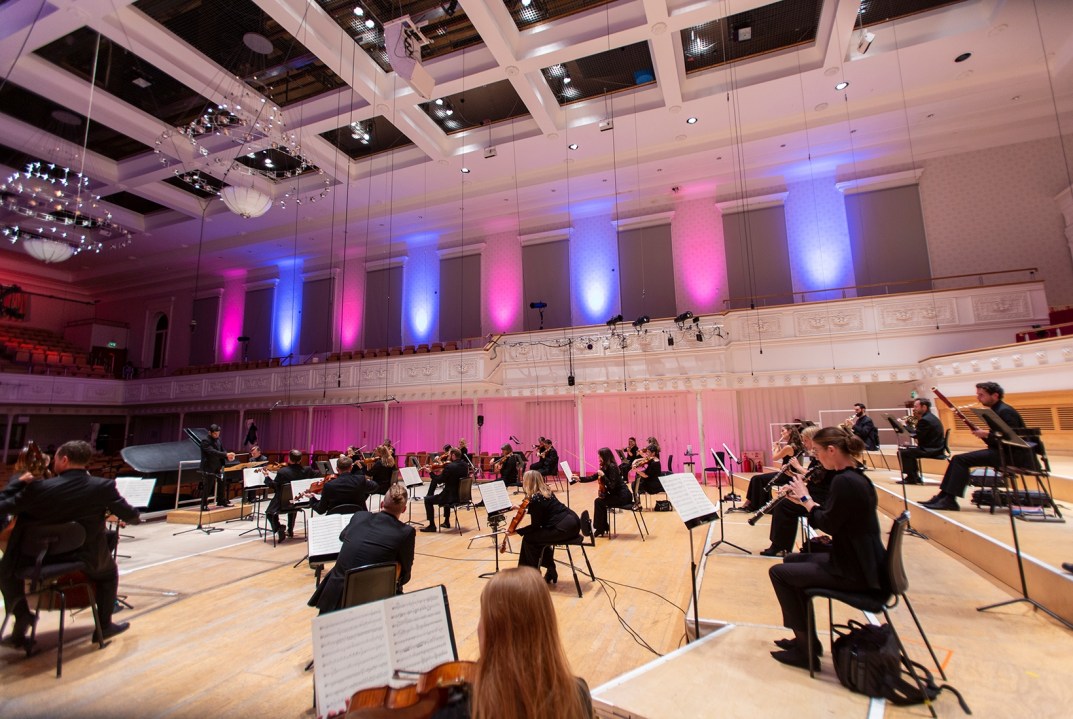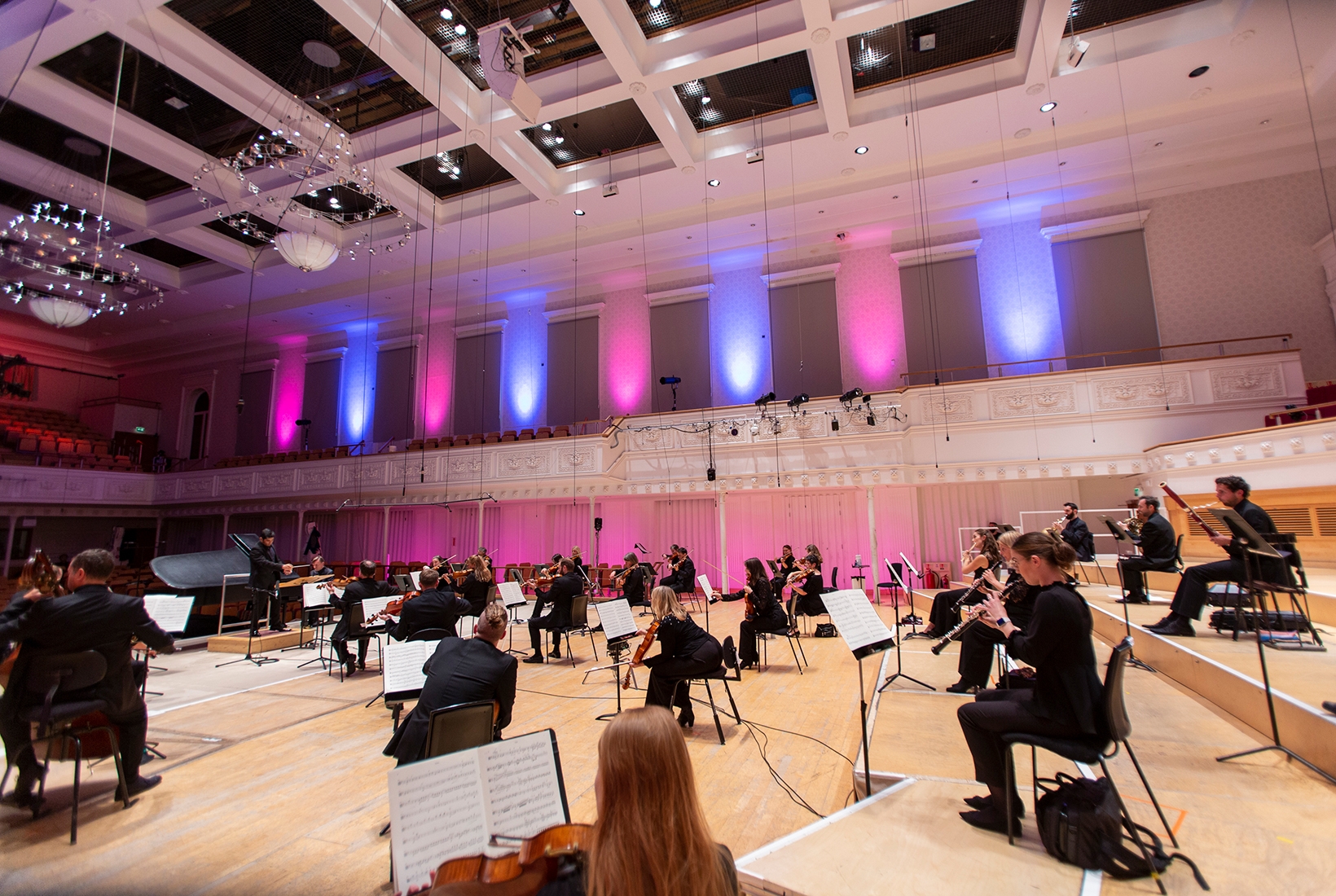Our college choirmaster had a trick that he liked to deploy when he sensed that we were phoning it in. He ordered us out of the choirstalls and positioned us at random all over the chapel. It was sadistic but effective. With nowhere to hide, there could be no quiet fudging of that awkward leap in ‘O Thou the Central Orb’, and no waiting until after a more confident neighbour had begun their note before scooping hastily (and hopefully unnoticeably) upwards to match their pitch. Every singer became a reluctant soloist. The result was usually either mutiny, or an immediate and dramatic improvement in tone, tuning and ensemble.
Apply that principle to the socially distanced orchestras in the current Proms season, and it’s no surprise that so many listeners seem to be finding these performances so affecting. One accusation that was frequently (and often baselessly) levelled at professional orchestras in normal times was that their playing was ‘routine’. Careful what you wish for: with wind players spaced yards apart, and strings separated from their usual desk-partners, orchestras have had the foundation of their familiar collective sound torn from under them. If we’re hearing orchestras playing as if every member is a soloist it’s because, for the duration of the crisis, that’s effectively what they are.
For the duration of the crisis, every member of an orchestra is playing as though they were a soloist
Which made Richard Strauss’s Metamorphosen a particularly apposite choice for the BBC Scottish Symphony Orchestra’s Prom at Glasgow City Halls. Strauss’s scoring for 23 solo strings is no arbitrary decision but a precise gauging of means to ends by a master-orchestrator at the end of a spectacular career. Every part matters, and each performer has to project their (often obsessively intricate) musical line as if they’re playing, if not a concerto, then at the very least a great string quartet. It’s yet another example of Strauss’s lifelong instinct for musical psychology. The intensity is baked into the score, and the string players of the BBCSSO went at it with a fervour that you wouldn’t have thought was possible in an empty hall.
True, it took a moment to settle down; but if the articulation of the opening bars was a bit emphatic (a species of over-compensation that’s not uncommon when orchestral musicians find themselves unexpectedly front and centre) it soon coalesced into a performance of vast, swelling musical arcs, with each successive paragraph carried on a teeming, endlessly unfurling stream of expressive detail. Molten sweetness suddenly hardened into huge black slabs of dread: impressive work from the BBCSSO’s recently appointed associate conductor Alpesh Chauhan, brought in at short notice after the original conductor Thomas Dausgaard fell foul of travel restrictions. Chauhan recently spoke in these pages of his devotion to Bruckner; on the strength of his Strauss, I’d say he has the makings of a first-rate Wagnerian. You heard it here first.
Earlier, Chauhan had conducted the première (having presumably learned the score pretty much overnight) of Jay Capperauld’s Circadian Refrains: a sort of passacaglia for orchestra, luminously scored, and built over 172 chords that represent Capperauld’s recent 172 days in lockdown. It’s a lot more organic and listenable than that makes it sound, and this young composer’s decision to end the piece with a return to its sombre opening material (coming after a climactic sunrise, and in defiance of Capperauld’s declared programme) suggests an encouraging determination to create actual music rather than sonic reportage.
Anyhow: if this Glasgow Prom demonstrated the unintended benefits of the current restrictions, a baroque gala from the Orchestra of the Age of Enlightenment back in the Royal Albert Hall highlighted some of the limitations. Nicola Benedetti had been due to perform a series of double violin concertos by Vivaldi and Bach, in partnership with Alina Ibragimova. With Ibragimova absent after a family bereavement, individual violinists of the OAE stepped up to take her place; some matching Benedetti note for exuberant note, and some audibly withering under the megawatt glare of her superstar charisma.
No fair-minded person could have held that against them. The real surprise was the big, warm and slightly splashy orchestral sound, marshalled rather than steered by Jonathan Cohen at the harpsichord. In the words of Scotty from Star Trek, ye cannae change the laws of physics. Light travels faster than sound; that’s a beast of an acoustic, and there’s a reason why conductors were invented. Personally, I rather like my Handel with a spot of reverb. But the period performance movement came of age in the 1970s, and there’s a certain kind of baroque head who still clings to the Habitat-era notion that ‘authentic’ period style is a hard-edged exercise in chilly sonic minimalism. The thought of the pasteboard-and-vinegar fundamentalists having simultaneous fits of the vapours all over the world made the whole thing even more fun.







Comments